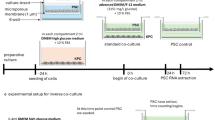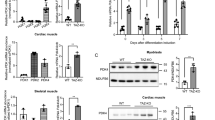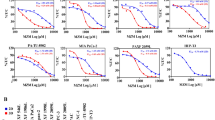Abstract
Dexamethasone converts pluripotent pancreatic AR42J cells into exocrine cells expressing digestive enzymes. In order to address molecular mechanism of this differentiation, we have investigated the role of mitogen-activated protein (MAP) kinase pathway and gene expressions of p21(waf1/cip1)and nuclear oncogenes (c-fos and c-myc) during AR42J cell differentiation. Dexamethasone markedly increased the intracellular and secreted amylase contents as well as its mRNA level. However, cell growth and DNA content were significantly decreased. With these phenotypic changes, AR42J cells induced transient mRNA expression of p21(waf1/cip1)gene, which reached maximal level by 6 h and then declined gradually toward basal state. In contrast to p21(waf1/cip1), c-fos gene expression was transiently inhibited by 6 h and then recovered to basal level by 24 h. Increased c-myc expression detected after 3 h, peaked by 12 h, and remained elevated during the rest of observation. Dexamethasone inhibited epidermal growth factor-induced phosphorylation of extracellular signal regulated kinase. Inhibition of MAP kinase pathway by PD98059 resulted in further elevation of the dexamethasone-induced amylase mRNA and p21(waf1/cip1)gene expression. These results suggest that p21(waf1/cip1)and nuclear oncogenes are involved in dexamethasone-induced differentiation and inhibition of MAP kinase pathway accelerates the conversion of undifferentiated AR42J cells into amylase-secreting exocrine cells.
Similar content being viewed by others
Article PDF
Author information
Authors and Affiliations
Rights and permissions
This is an Open Access article distributed under the terms of the Creative Commons Attribution Non-Commercial License (http://creativecommons.org/licenses/by-nc/3.0/) which permits unrestricted non-commercial use, distribution, and reproduction in any medium, provided the original work is properly cited.
About this article
Cite this article
Eum, W., Li, M., Sin, G. et al. Dexamethasone-induced differentiation of pancreatic AR42J cell involves p21(waf1/cip1)and MAP kinase pathway. Exp Mol Med 35, 379–384 (2003). https://doi.org/10.1038/emm.2003.50
Published:
Issue date:
DOI: https://doi.org/10.1038/emm.2003.50
This article is cited by
-
Resveratrol mobilizes Ca2+ from intracellular stores and induces c-Jun N-terminal kinase activation in tumoral AR42J cells
Molecular and Cellular Biochemistry (2012)
-
Clinical analyses of Japanese bladder and upper urinary tract (UUT) cancers using the level of serum amylase (Amy): theirs prognosis and treatment
Comparative Clinical Pathology (2011)
-
Overexpression of Glucocorticoid Receptor in Human Pancreatic Cancer and in Xenografts. An Immunohistochemical Study
Pathology & Oncology Research (2009)



